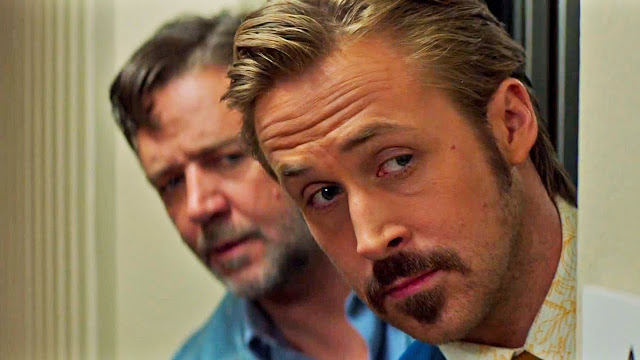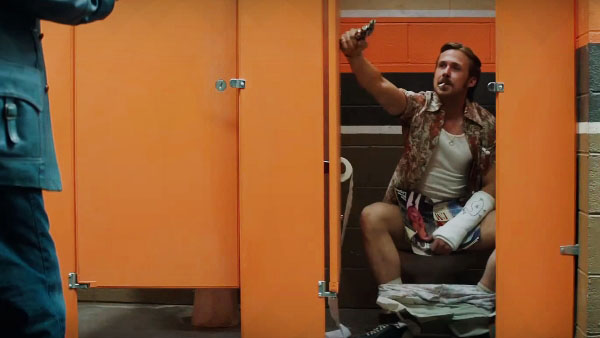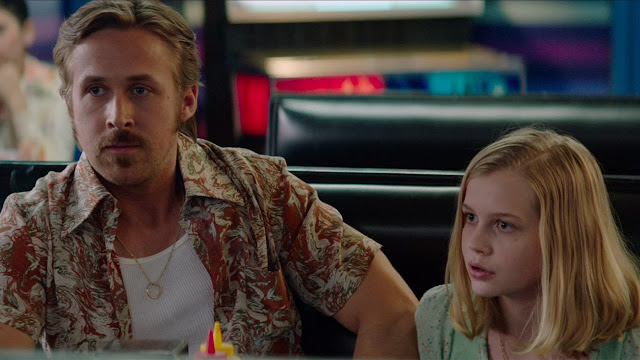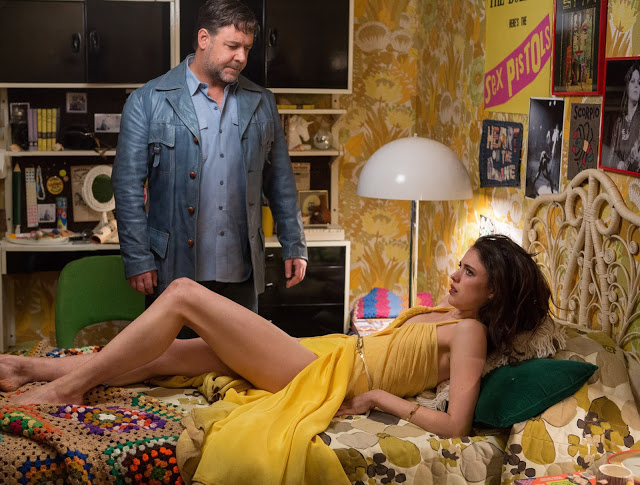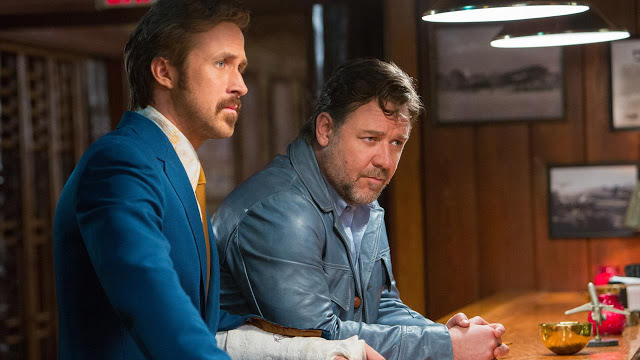Shane Black loves misfits. His screenplay for Lethal Weapon spawned countless derivative buddy-cop movies, but its heart lay in the fragile eccentricity that made Mel Gibson’s Martin Riggs such a dashing and dangerous hero. His script for The Last Boy Scout paired two fallen losers—a disgraced ex-Secret Service agent (Bruce Willis) and a former football star (Damon Wayans)—then watched with glee as they stumbled into a ludicrous plot involving illegal sports gambling. And Kiss Kiss Bang Bang, his directorial debut, starred Robert Downey Jr. as a hapless unemployed actor whose motor-mouthed speech was exceeded in speed only by the bullets whizzing past him. All three movies indulge in hard-boiled genre thrills—double-crosses, overbaked conspiracies, larger-than-life villains—but they’re elevated by a writer’s true love for his characters and his words. Now, Black is back with The Nice Guys, a caper-comedy that both exposes the director’s worst tendencies and showcases his unique brilliance.
The flaws of this disposable, delightful film are obvious. It’s too long, its action is dull, its violence is pointless, and its plotting is simultaneously overcomplicated and undercooked. With a different director, these deficiencies might be crippling, but with Black (who shares scripting duties here with Anthony Bagarozzi), they’re trivial. You don’t watch The Nice Guys to see what happens next. You watch The Nice Guys to hang out with the nice guys.
Who are, of course, not very nice at all. Black’s chatty oddballs may be imbued with a core nobility, but they’re never saints. That’s certainly true of Jackson Healy (Russell Crowe), a laconic mercenary who makes his living driving around Los Angeles (the year is 1977), assaulting wife-beaters, crappy fathers, and pretty much anyone else you want hospitalized, provided you pay him in advance. Built like a block of wood and just as perturbable, Healy is the embodiment of noirish competence; he gets the job done, baby, and he barely breaks a sweat or arches an eyebrow while doing it. This makes him a sensible hire for Amelia (The Leftovers‘ Margaret Qualley), a sassy looker who informs Healy that a mustachioed creep won’t leave her alone and requests that he please do something about it. And so it goes that Healy comes face-to-face—and then fist-to-jaw—with Holland March.
March is played, in one of the finest pieces of comic screen acting I’ve ever seen, by Ryan Gosling, a prodigiously gifted actor who has occasionally allowed his sex appeal to overwhelm his talent. He’s in peak form here, which is more than you can say for March. First glimpsed swilling whiskey in a bathtub while fully clothed, March is a private detective who looks like he can locate neither his dignity nor his car keys. Cinema has an illustrious history of shrewd private eyes, from Sam Spade to Philip Marlowe to Jake Gitties, but March is something else. Where Healy is brusquely efficient, March is bizarrely intuitive—half-Hercule Poirot, half-Inspector Clouseau. He is a genius, a prophet, and a hero. He is also a drunkard, a coward, and a fool.
All sorts of stuff happens in The Nice Guys, but its entire reason for being is the ragged partnership that inevitably forms between Healy and March. They are not so much opposites as twisted complements, Healy’s prosaic ruggedness mingling beautifully with March’s poetic irreverence. The result is comedy nirvana, a nimble ballet of outlandish pratfalls, wry insults, and tossed-off one-liners. Black’s dialogue is as flavorful as ever, but the physical humor is just as successful, whether it’s March tumbling down an embankment, Healy and March attempting to dispose of a corpse, or—in the movie’s single greatest scene—March attempting to intimidate Healy but being soundly defeated by the door to a bathroom stall.
If that sounds less than hysterical, it’s because words can only do so much justice to Black’s sense of timing, and to the actors’ limber performances. Crowe, coming off solemn turns in Noah and The Water Diviner, hasn’t appeared this relaxed in some time; he wisely underplays Healy, allowing laughs to bubble up from the character’s essential stillness. He also recognizes that this is Gosling’s movie. March is a magnificent character, and Gosling portrays him with just the right combination of intelligence and idiocy. “You’re the world’s worst detective,” someone snarls at March, and it’s a charge that proves both accurate and, under Gosling’s stewardship, stupendously wrong.
The leveler of that particular accusation is March’s daughter, Holly (Angourie Rice, very good), a precocious pre-teen who verbally spars with her father the same way Danielle Harris did with Bruce Willis a quarter-century ago in The Last Boy Scout. Holly is a bright young girl, though March repeatedly chastises her for habitually ending sentences with the phrase “and stuff”. That’s a cute little runner that reaffirms Black’s love of grammar (recall Kiss Kiss Bang Bang, where Michelle Monaghan lectured Robert Downey Jr. on the difference between “bad” and “badly”), but Holly isn’t the only figure in this film with a rambling problem. Her director is guilty of the same crime, though his error is artistic rather than linguistic.
By which I mean, The Nice Guys is full of “and stuff”. Its story is crammed with material, including a dead porn star, a ranting aunt, a MacGuffin in the form of a person, a nefarious conspiracy involving the auto industry, and a fretting mother (Kim Basinger, strained) who may know more than she lets on. That’s plenty to process on its own—imagine L.A. Confidential crossed with The Big Lebowski—but The Nice Guys isn’t just another neo-noir in which two dudes team up to solve a convoluted mystery. It is also a fairly banal action movie, replete with prolonged gunfights featuring a remorseless assassin (Matt Bomer, from the Magic Mike movies), as well as a host of anonymous bad guys who can’t shoot straight. March is given a flimsy backstory involving a fire, while Healy receives a tonally dubious subplot concerning his penchant for frontier justice. Both characters open the movie with unnecessary voiceovers (Black wisely excises them after the first reel). There is even a scene where March hallucinates a gigantic, talking bumblebee. It’s small wonder that a crucial plot point revolves around an overstuffed suitcase.
It’s easy to criticize Black for indulging in such overkill, and it’s tempting to imagine a stripped-down version of The Nice Guys that junks the extraneous pulp and instead zeroes in on its richly drawn characters. But Black has always been an acolyte of excess, and he likes to use extreme genre filmmaking to accentuate his protagonists’ quirkiness. That’s fine in theory, and it does result in some inspired, tension-slicing moments here, such as when March inadvertently tosses a revolver through a window. Nevertheless, Black’s insistence on saddling his comedy with potboiler tropes would be more persuasive if he seemed invested in executing them with any degree of panache. Instead, he’s mostly going through the motions during the action sequences (just as he did during the dreary climax of Iron Man 3), amping up the noise without considering why we started listening in the first place.
But maybe Black’s insouciance is rubbing off on me, because while I acknowledge The Nice Guys‘ weaknesses, I don’t really care. Yes, the shootouts are dull, and the story verges on nonsense. Big deal. I can tolerate some lazy violence in a movie where the heroes, desperate to rescue a damsel in distress, step off an elevator, silently eyeball their chaotic surroundings, then quietly step back inside rather than joining the brawl. There’s a great gag involving cold coffee, and another with mermaids, and there’s a kid who dubs himself “a projectionalist”, and did I mention that the dialogue is by Shane Black? The Nice Guys may be messy, but it’s also funny, and that’s more important.
Yet it is more than just cheerfully amusing. Plenty of comedies are sporadically funny, and while The Nice Guys‘ laugh quotient is substantially higher than its peers, it’s a movie with real heart behind it. Black is hardly the most emotive filmmaker, but his affection for Healy and March is undeniable, and it lends the movie a certain sweetness that stealthily infiltrates all the swearing and the shooting and the gut-busting. Healy may be a brute, and March may be a buffoon, but you wind up caring about them anyway—they’re just too much fun to resist. And The Nice Guys, while imperfect, is ultimately charming. It’s a good movie and stuff.
Jeremy Beck is the editor-in-chief of MovieManifesto. He watches more movies and television than he probably should.

